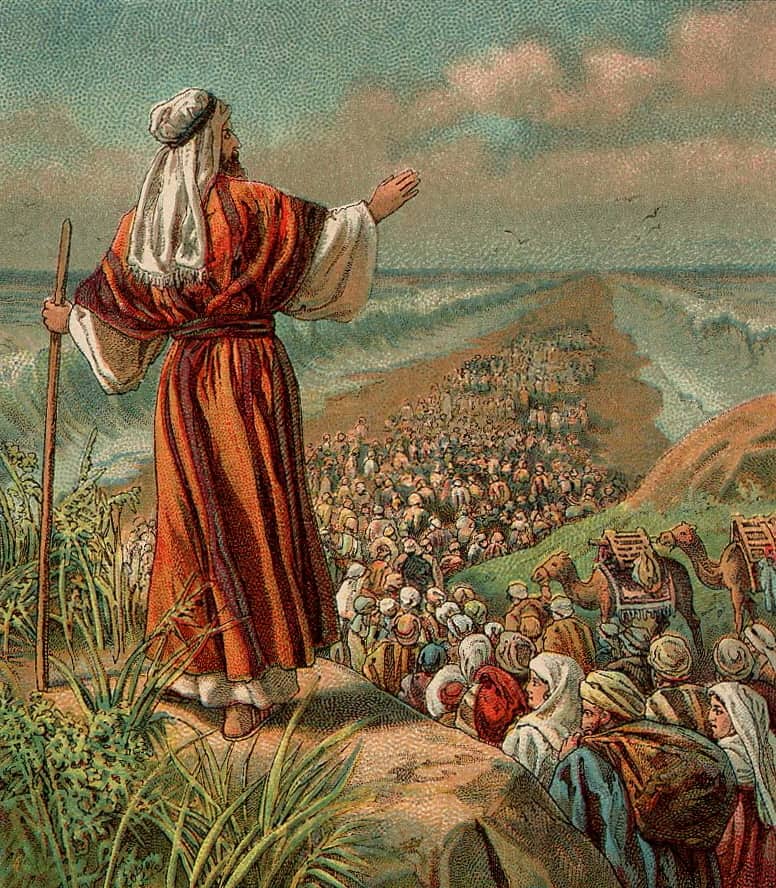Exodus 14:1-2 reports, “Then the LORD spoke to Moses: ‘Tell the Israelites to turn back and camp in front of Pi-hahiroth, between Migdol and the sea; you must camp in front of Baal-zephon, facing it by the sea.” Despite the specificity of this verse and other verses regarding locations, it is difficult to pinpoint the exact route Moses and the Israelites took after leaving Egypt. However, the next verse sheds light on one reason Pharaoh decided to pursue the Israelites, and it enhances our understanding of the phrase “turn back” in verse 1. Verse 3 says, “Pharaoh will say of the Israelites: They are wandering around the land in confusion; the wilderness has boxed them in.” Clearly, God was making it look as if the Israelites didn’t know where they were going—yet He also was placing them in a situation that would have been impossible for them apart from divine intervention.
The “sea” to which Exodus 14:2 refers is the Red Sea (see 13:18; 15:4). Interestingly, the Hebrew word translated Red doesn’t typically mean “red,” but “reed”—so the sea actually could be called the Sea of Reeds or the Reed Sea. (The word is translated reeds in Ex. 2:5 and rush in Isa. 19:6.) Another possible translation of the word is “end” (as it is translated in 2 Chron. 20:16 and Eccl. 3:11)—thus making “sea at the end of the world” another plausible name for this body of water. Even if one of these translations is more accurate than “Red Sea,” the accuracy of the account of the miracle recorded in Exodus 13 need not be questioned. The presence of reeds in a body of water does not mean it is shallow throughout!
Just where did the Israelites cross? We need to keep in mind that the topography of the region has changed since the Exodus, in part due to the construction of the Suez Canal. Still, moving from north to south, it can be suggested that the Israelites crossed the sea near Lake Ballah, Lake Timsah, the Bitter Lakes area, or at the northern tip of the Gulf of Suez. Unfortunately, we do not know with certainty which of these areas was the actual the site of the miraculous crossing of the Israelites and the drowning of the Egyptian army.
Moses stretched out his hands over the sea, and God divided the water to make it possible for the Israelites to cross. Once they had made their way to the other side, God directed Moses to stretch out his hand over the sea once more. (See Ex. 14.) The Egyptian army was in hot pursuit in the middle of the sea, but its waters crashed upon them, causing them to drown in a dramatic display of God’s power. Thus, Moses and the Israelites sang a song of praise to God that included these words: “I will sing to the LORD, for He is highly exalted: He has thrown the horse and its rider into the sea” (15:1). God had delivered His people!
Copyright © 2017 by B. Nathaniel Sullivan. All rights reserved.
Unless otherwise noted, all Scripture quotations in this article have been taken from the Holman Christian Standard Bible®, Copyright © 1999, 2000, 2002, 2003, 2009 by Holman Bible Publishers. Used by permission. Holman Christian Standard Bible®, Holman CSB®, and HCSB® are federally registered trademarks of Holman Bible Publishers.
